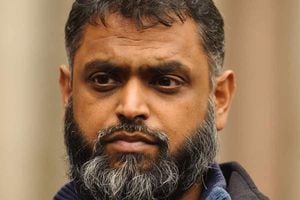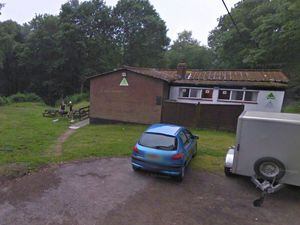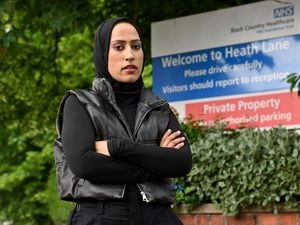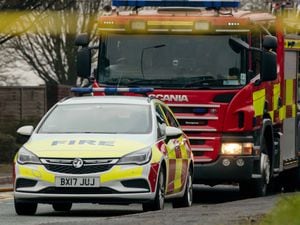Terror charges dropped against former Wolverhampton University student Moazzam Begg
Former Guantanamo Bay detainee Moazzam Begg will walk free from prison after prosecutors dropped seven terror charges against him linked to the civil war in Syria.

The 45-year-old from Birmingham appeared before the Old Bailey via video link from high security Belmarsh prison when Mr Justice Wilkie formally acquitted him of all charges.
Begg spoke only to confirm his name and made no reaction as the prosecutor offered no evidence following a review of the case. He is expected to be released from the south east London jail later today.
Watch the interview with West Midlands Police assistant chief constable Marcus Beale below.
The former law student at Wolverhampton University has been in custody for seven months awaiting a trial which was due to start on Monday.
At an earlier hearing he had pleaded not guilty to all the charges.
But at a pre-trial review today lasting just five minutes the prosecution dramatically dropped the case.
Prosecutor Christopher Hehir said: "The prosecution in every criminal case of every type have a duty to keep under review the sufficiency of the evidence.
"When Mr Begg was charged with a number of offences earlier this year the Crown Prosecution Service were satisfied there was sufficient evidence to afford prosecution.
"In the months that have followed the prosecution have kept under review the sufficiency of the evidence in this case.
"The prosecution have recently become aware of relevant material and in light of which, after careful and anxious consideration, have reached the conclusion that there is no longer a realistic prospect of conviction in this case. The prosecution therefore offer no evidence."
The judge responded: "On the indication of the Crown offering no evidence verdicts of not guilty should be entered."
Begg was charged with seven counts. The first related to attending a terrorism training camp in Syria between October 9, 2012 and April 9, 2013.
The next five charges were for the possession of "an article" for a purpose connected to terrorism between December 31, 2012 and February 26, 2014.
They were listed as being electronic documents with the titles Camp 1, Camp 2, Tactical Training Schedule, Camp Rules, and Fitness Training Schedule (training exercises).
Finally, Begg, of Boden Road, Hall Green, Birmingham, was charged with funding terrorism by making available a Honda generator between July 14 and July 26, 2013.
Following today's brief hearing, West Midlands Police assistant chief constable Marcus Beale said: "Terrorism investigations are often long and complex. This case was no exception.
"New material has recently been disclosed to police and CPS, which has a significant impact on key pieces of evidence that underpinned the prosecution's case. Our criminal justice system - quite rightly - demands a very high standard of proof.
"I understand this is going to raise many questions. However, explaining what this newly revealed information is would mean discussing other aspects of the case which would be unfair and inappropriate as they are no longer going to be tested in court.
"From the beginning this case has challenged the relationship between West Midlands Police and some of the communities we serve.
"I would like to reassure them and Mr Begg that at every stage of this investigation my officers acted in the best interests of the public and of justice.
"This case has been investigated in a diligent and professional manner. Today's events demonstrate that the police and CPS continually assess the evidence in terrorism prosecutions and will alter course if that is the right and proper thing to do."
Begg had been held in custody since March and was refused bail at a hearing in May despite fears for his mental health.
The court heard that Begg was suffering from post traumatic stress disorder from his time in Guantanamo Bay.
And some of his symptoms had re-emerged since he has been in custody at Belmarsh, his lawyer Ben Emmerson QC said: "Theoretically the longer he is in custody the worse there are likely to become."
The court was told that " a very substantial body of sureties" amounting to hundreds of thousands of pounds had been offered by Begg's family and supporters, including lawyer Clive Stafford-Smith who represented him in the Guantanamo case.
On the evidence against him, Mr Emmerson told the court that his client had travelled extensively in the nine years since his release from Guantanamo Bay as a public figure, including to Syria.
He told the court: "He has never made any secret of his visits to Syria and on two occasions informed authorities of his travel plans.
"Mr Begg did not train anyone for the purposes of terrorism as defined in the 2001 act. Mr Begg says he was involved in training young men to defend civilians against war crimes by the Assad regime."
The lawyer went on to suggest Begg's activities in Syria were not at odds with the British government's attitude on non lethal support.
He said: "This is not some sort of political defence. This is a serious point about the lethal and physical limits of the definition on terrorism because if the defence says the occasions concerned were defensive actions, in much the same way the UK was itself providing non lethal aid itself, then we submit that would not be defined as an act of terrorism."
Begg had also received a letter of support from the humanitarian Terry Waite who was held hostage in Lebanon between 1987 and 1991, the court heard at an earlier hearing.
But Mr Justice Wilkie refused bail after prosecutor Brian Altman QC said he might abscond before his trial or commit more offences.
Outlining the case against him, Mr Altman told the court that material had been found on his iPhone showing that Begg had been involved with training programmes in Syria over six months, during which time had had assumed a role of power and authority.
Mr Altman also highlighted a transcript of Begg's conversations which had been produced as a result of a "covert probe".
Complaining of new arrivals' apparent lack of maturity and experience, Begg is heard to say: " Jihad is not just a physical capacity but also about using your brain."
On the need for training, Begg also says: "They want to call it martyrdom but I said we have to be physically prepared. If you don't prepare this just becomes suicide, not martyrdom."
"In my opinion a person going over to fight for the rights of Muslims - I do not see what the problem is."
But Mr Altman asserted: "Jihad is not about self defence of an otherwise defenceless population."
"The strength of the evidence cannot be overlooked. There is no dispute as to what the acts of this man were. It's what interpretation is to be cast upon it."
Asim Qureshi, research director of campaign group Cage, where Mr Begg works as an outreach director, said: " This has been a testing time for Moazzam, his family and the Muslim community.
"T he criminalisation of virtually any Muslim that has been to Syria has only increased in intensity, while Cage has been attacked from every angle by a host of government agencies.
"We hope that Moazzam's release is a sign that the Government are now willing to adopt a more measured strategy in relation to anti-terrorism policy and avoid the attempt to criminalise all dissent and crush any organisation like Cage that stands up for the rule of law and justice.
"Cage and Moazzam have been maligned, defamed and vilified by far too many and we hope that now our calls for the protection of basic rights, and innovative approaches built on dialogue to dispute resolution, will now be heeded.
"Violence and the destruction of freedoms and liberties inherent in the War on Terror doctrine can never be the solution."





